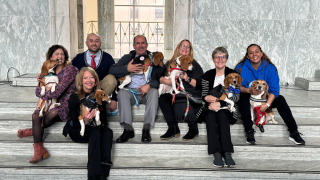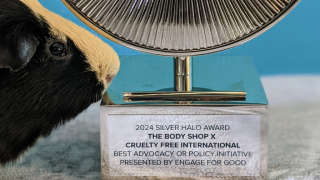
Throughout ‘the year of the election’ – as 2024 was widely known – we were working with politicians and decision-makers to keep animal testing on the agendas of governments around the world.
We began the year in London, launching our Target Zero report, to support the phase-out of animal testing in the UK with practical, low-cost and concrete steps that any future government could take in its first term, at the House of Commons. Ten MPs attended the event, and four more joined our Pledge Cruelty Free campaign.
In February, following our years of campaigning on the HEARTS (Humane and Existing Alternatives in Research and Testing Sciences) Act, the U.S. National Institutes of Health (NIH) prioritized investment in non-animal methods of research. A working group report, inspired by the Act, highlighted the many ways that animal-free science is already benefitting many areas of biomedical research.
Our first-ever Cruelty Free Science Day at the U.S. Capitol in Washington D.C, in March, showcased cutting-edge non animal testing technology. The day was held in conjunction with lead sponsor of the HEARTS Act, Rep Chris Pappas (NH-01), and attended by developers of non-animal testing methods from the U.S., Canada and UK. We shared details of the HEARTS Act, Humane Cosmetics Act and Companion Animal Release from Experiments (CARE) Act. Last but not least, there was also a chance for attendees to meet six adorable beagles rescued from a research breeding facility!

Also in March, the American Bar Association (ABA), the largest voluntary professional association in the world which represents the legal profession in the United States, called on governments to promote and create incentives for the use of non-animal testing methods. We were one of the lead co-authors of the report and resolution, voted on by members, which prompted its first ever statement on animal testing.
We continued to work with the European Medicines Agency (EMA) in April, to shape their 2024 goals to replace, reduce and refine the use of animals in regulatory testing. Many of those goals support the aims of our Replace Animal Tests (RAT) List, which highlights ten animals tests that are still used despite the existence of valid non-animal replacements. We made a presentation to the EMA’s 3Rs Working Party, who advise the EMA on the use of animals in regulatory testing, and continue to join their meetings.
We also continued to engage with the OECD’s (Organisation for Economic Co-operation and Development) animal protection council, which ensures that non-animal testing methods are included in the OECD’s development of standardised chemical testing guidelines. We are also part of discussions on the European Commission’s proposed roadmap to end animal testing in regulatory chemical testing.
Our relationship with the ABA continued in May as we led a global webinar on the rehoming of companion animals released from laboratories, in collaboration with them, Save The Buns and The Beagle Alliance. 16 U.S. states already have laws allowing the adoption of animals after they have been used in laboratories – but there is not yet any nationwide federal law, something the CARE Act hopes to remedy by ensuring that animals released from NIH-funded facilities find loving homes.

In June, our ‘Forever Against Animal Testing’ Canadian partnership with The Body Shop received its second Halo Award from the Engage For Good corporate social responsibility programme. We won the silver award in the ‘Best Advocacy or Policy Initiative’ category at the 2024 ceremony, having also won the silver award in 2018 for delivering the largest petition delivered to Ottawa’s Parliament Hill in over 70 years - with over 630,000 Canadian signatures supporting a ban on cosmetic animal testing. With a mission to end animal testing for cosmetics in Canada, our decade-long campaign with The Body Shop ended in December 2023 when Canada became the 44th country to pass laws to end or limit cosmetics animal testing and/or sales.
In the UK, the calling of a snap General Election – and the publication of party manifestos – saw us react to Labour’s commitment to phase-out animal testing. Our own election campaign continued through to the July polls, as over 14,000 supporters contacted their MP or election candidates and we received pledges from 307 Parliamentary candidates to support cruelty-free policies.
After Labour’s victory, we quickly published our First Steps report, detailing the concrete actions that the new government could immediately take to begin their efforts in phasing out animal testing. The report was sent to key government ministers, including the Home Secretary, and Ministers for the Environment, Health, and Science and Technology.

With European Union elections soon to follow, in August our sister organisation, Cruelty Free Europe, made a number of recommendations to improve the welfare of animals in laboratories, after new stats revealed that a shocking 9.6 million animals were bred and killed in laboratories, in addition to those used in actual experiments, in the EU and Norway in 2022. To help the European Commission meet its goal of ending the use of live animals for scientific purposes, and its commitment to create a roadmap to phase out the use of animals in chemical safety testing, Cruelty Free Europe made recommendations to improve the protection and welfare of animals used in science.
In September, our Head of Public Affairs (UK & EU), Dylan Underhill, was part of a Labour Animal Welfare Society panel event at the Labour Party Conference in Liverpool, at which Minister for Animal Welfare, Baroness Sue Hayman of Ullock, announced that Lord Patrick Vallance, Minister of State for Science, Research and Innovation, is leading the development of Government plans to phase-out animal testing in the UK.
During the Labour Party Conference, we also took our vision for a cruelty-free future to the streets of Liverpool, unveiling our 3D pavement artwork to highlight how testing on animals is linked to products we use every day. The artwork captures a typical British living room, illustrating how the manufacture, processing and approval of almost every item in our homes can be associated with animal testing, from furniture polish and air freshener to the paint on your walls.

We then returned to the U.S. Capitol in October, to meet with legislative officers to discuss the HEARTS Act, CARE Act, and Humane Cosmetics Act. The visit coincided with the inaugural International Collaboration on Cosmetics Safety (ICCS) Annual Meeting in Washington DC, which we proudly sponsored to bring together global experts to advance animal-free science through research and education.
Advancing our mission to end animal testing worldwide, in November our CEO Michelle Thew was invited to speak at CommonShare’s Sustainability, AI & Innovation Summit in Barcelona. During the event, Michelle shared the stage with a distinguished panel of thought leaders, exploring the Green Claims Directive, a key regulation aimed at combating greenwashing, and highlighting the crucial role that approval programmes like our Leaping Bunny Programme can play in supporting this regulation.
We also played a key role, with other animal protection NGOs, in campaigning for changes to the revision of Europe’s Classification, Labelling and Packaging (CLP) regulation. These amendments came into effect in December, and meant that the use of non-animal methods for the safety testing of chemicals could increase across the EU.
The changes set a commitment for the European Commission to “promote, monitor and regularly evaluate” innovation in advancing the adoption of non-animal methods while ensuring that regulation is up-to-date. The CLP regulation, first introduced by the EU in 2008, is currently behind the latest advancements in non-animal science.
Our work also continued in Canada, as we gave feedback on the government’s proposed plan to reshape the testing of substances under the Canadian Environmental Protection Act (CEPA). Whilst welcoming the proposed shift towards non-animal testing methods, we asked that the strategy places stronger emphasis on the complete replacement of animal tests and greater funding for the development of non-animal alternatives.

After co-signing an open letter to the Prime Minister, Sir Keir Starmer, urging progress on the government’s commitment to phase-out animal testing, we ended the year as we had begun – in London at the House of Commons – to hold a successful Christmas Reception. Our co-host, Labour MP Sarah Champion, called on supporters to ‘not let Labour off the hook’ in their push to end animal testing in the UK at an event attended by over 25 MPs, Parliamentary Assistants, and senior figures from more than 10 Leaping Bunny approved brands. Champion, MP for Rotherham, also reiterated her call for a 'cruelty-free Christmas' just days after Leader of the House, Lucy Powell MP, had wished the same for the entire country.
Together, we can create a cruelty-free world. Positive steps in 2024 show the strength of raising our voices – and 2025 is already shaping up to be even more successful!
You can support a cruelty-free UK by making a donation today.
